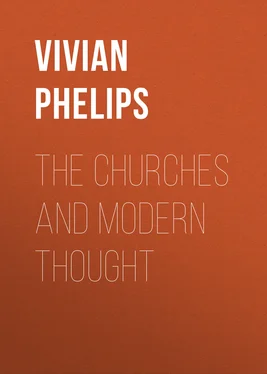Vivian Phelips - The Churches and Modern Thought
Здесь есть возможность читать онлайн «Vivian Phelips - The Churches and Modern Thought» — ознакомительный отрывок электронной книги совершенно бесплатно, а после прочтения отрывка купить полную версию. В некоторых случаях можно слушать аудио, скачать через торрент в формате fb2 и присутствует краткое содержание. Жанр: foreign_prose, foreign_religion, Философия, foreign_antique, на английском языке. Описание произведения, (предисловие) а так же отзывы посетителей доступны на портале библиотеки ЛибКат.
- Название:The Churches and Modern Thought
- Автор:
- Жанр:
- Год:неизвестен
- ISBN:нет данных
- Рейтинг книги:4 / 5. Голосов: 1
-
Избранное:Добавить в избранное
- Отзывы:
-
Ваша оценка:
- 80
- 1
- 2
- 3
- 4
- 5
The Churches and Modern Thought: краткое содержание, описание и аннотация
Предлагаем к чтению аннотацию, описание, краткое содержание или предисловие (зависит от того, что написал сам автор книги «The Churches and Modern Thought»). Если вы не нашли необходимую информацию о книге — напишите в комментариях, мы постараемся отыскать её.
The Churches and Modern Thought — читать онлайн ознакомительный отрывок
Ниже представлен текст книги, разбитый по страницам. Система сохранения места последней прочитанной страницы, позволяет с удобством читать онлайн бесплатно книгу «The Churches and Modern Thought», без необходимости каждый раз заново искать на чём Вы остановились. Поставьте закладку, и сможете в любой момент перейти на страницу, на которой закончили чтение.
Интервал:
Закладка:
St. Luke is, according to Dr. Robinson, the fellow-traveller of St. Paul, and the date of his Gospel shortly after 70. Regarding St. John’s, we are informed that Dr. Harnack fixes the date between 80 and 110, and thinks that it was written by another person of the same name—John the presbyter, or elder, of Ephesus. Dr. Robinson, however, in a chapter he devotes to the subject of the fourth Gospel, attempts to show its apostolic authorship.
Dr. Robinson admits that the authorship of all four Gospels is doubtful, but thinks that, regarding the second Gospel, we may accept the second-century tradition that it was written by St. Mark, and that St. Mark was the “interpreter” of St. Peter and wrote the Gospel in Rome from information derived from that Apostle. Very good; let us accept this conclusion. We have it, then, that one of the Gospels is from the mouth of an eye-witness. This eye-witness, however, was, after all, an eye-witness of only one year (or, according to conservative criticism, three years) of Christ’s life; he was an illiterate person, and the information he imparted after thirty or forty years had to be written down by another person in another language, and there is no telling how faithful or unfaithful the translation may have been. Besides, as Dr. Robinson points out in his chapters on “The Great Sermon” and “The Non-Marcan Document,” there are very important omissions in St. Mark’s Gospel. Referring to a supposed source for the information furnished by other evangelists, but omitted by St. Mark, he says: “You may gain some general idea of the scope of this document (the Non-Marcan 73 73 A Greek document which is supposed to have existed and then to have been entirely lost (imagine God’s Word lost !), and to contain some of the matter related by St. Matthew and St. Luke, while omitted by St. Mark. N.B. —While the evangelist St. Mark is relegated to the position of a translator only, St. Matthew and St. Luke are taken by orthodox theologians to be mere copyists of St. Mark and a “lost” document!
) by underlining in St. Luke’s Gospel all those portions which are to be found in St. Matthew, but are not to be found in St. Mark.”
Now, what are these omissions in St. Mark? Are they trivial? Let us judge for ourselves by taking a few selections. There is no mention whatever of the story of Christ’s miraculous birth, nor of the other incidents of His childhood which are said to be in fulfilment of prophecy, and there is no mention of the great Sermon on the Mount. The story of the Resurrection is told in a few sentences, and the Ascension in one sentence. Unfortunately, too, these very sentences are admittedly interpolations, and St. Mark really ends at xvi. 8. 74 74 See art. “Gospels,” in the Enc. Bib. , and Westcott and Hort, The New Testament in the Original Greek .
So there is no account of either the Incarnation, Resurrection, or Ascension, and we are left with oral traditions, “lost” documents, and unknown copyists, as the only source from which to obtain any detailed information concerning the very groundwork of our Creed! Could anything be more unsatisfactory, more calculated to arouse suspicion of the “Christian Verities”—the Gospel truths? I am completely at a loss to understand how the Bishop of Gloucester 75 75 In his address at the Church Congress held at Weymouth in 1905.
can say that the “Higher Criticism” has been a “gain to the Church,” or the Bishop of London 76 76 In his address at the Church Congress held at Weymouth in 1905.
that “the New Testament stands ten times as strong as it did fifty years ago.” It would seem to be a case of “where ignorance is bliss,” etc., or else of the wish being father to the thought.
There is much more that I should wish to call attention to, did space permit, but I have now, I think, given some insight into modern Bible criticism, and the extent to which it is accepted by Christians. It only remains, in conclusion, to ask for earnest thought on this new aspect of “the Word of God.” In doing so the following additional considerations may be borne in mind.
§ 5. Some Remaining Difficulties
The orthodox and traditional view of the Old Testament is preserved in the unrepealed “Blasphemy Act,” 9 and 10, William III., cap. 32, which enacts that any person who shall deny the “Holy Scriptures of the Old and New Testament” to be of “divine authority” shall be incapable of holding any public office or employment, and shall, on a second conviction, also suffer imprisonment for a space of three years. The Vatican Council of 1870, “speaking under the inspiration of the Holy Ghost,” declared that the books of the Old and New Testament “have God for their author, and, as such, have been delivered to the Church.” The Council, therefore, ordained that the man should be anathema who refused “to receive, for sacred and canonical, the books of the Holy Scripture in their integrity, with all their parts.”
Dr. Bayley expressed the opinion of his day when he wrote 77 77 In his work, Verbal Inspiration . Quoted by Bishop Colenso in The Pentateuch Examined .
: “The Bible cannot be less than verbally inspired. Every word, every syllable, every letter, is just what it would be had God spoken from heaven without any human intervention. Every scientific statement is infallibly correct; all its history and narratives of every kind are without any inaccuracy.”
Listen, again, to the words of a well-known divine of our own Church, spoken but yesterday: “The whole of the teaching of the New Testament is based upon the supposition that God made a covenant with Abraham.” 78 78 The Dean of Canterbury, speaking on the Bishop of Winchester’s paper at the Church Congress, 1903.
“You have our Lord Jesus Christ building His whole life on the Scriptures, and submitting to death in obedience to them.” 79 79 The Dean of Canterbury, speaking in St. Mary Bredin’s Church, Canterbury, December 4th, 1904.
This is the strictly orthodox opinion, and it is consistent with Christian doctrine. Yet, for obvious reasons, the Old Testament is now regarded as an incubus by an increasing number of earnest Christians.
In the New Testament there are many cruel sayings attributed to Jesus. Only the few are to be saved from the eternal torments of the damned (St. Matt. xiii. 10–13, xxii. 14, xxv. 41; St. Mark iv. 11–12, xvi. 16, etc.). Happily, owing to the rise of Rationalism and the consequent subjection of the Bible to criticism, the dogma of eternal torment is disputed on all sides, and the Athanasian Creed will soon no longer be forced upon us. The principle of the “chosen few” is so clearly Christ’s teaching, and furnishes such a convenient explanation for the attitude of the many, that it is commonly adhered to; but liberal theologians no longer hold that “he that believeth not shall be damned,” or that the punishment of the sinner is to be excruciating torture for all eternity. Unbelievers and sinners may all ultimately be saved, or at the worst their existence will end with this life. Good, very good; such views appeal to us as being more humane and rational; but are they compatible with the truth of the Bible? Mark the words of the late Bishop of Manchester: “The very foundation of our Faith, the very basis of our hopes, are taken from us when one line of that sacred volume, on which we base everything, is declared to be untruthful and untrustworthy.” Thus it is that there are many who would still retain the inhuman doctrines ascribed to the Master. Fearful of losing the basis of their hopes, and unconscious, apparently, of their sublime egoism, they reason, and reason with logic: We must accept the whole or reject the whole.
Читать дальшеИнтервал:
Закладка:
Похожие книги на «The Churches and Modern Thought»
Представляем Вашему вниманию похожие книги на «The Churches and Modern Thought» списком для выбора. Мы отобрали схожую по названию и смыслу литературу в надежде предоставить читателям больше вариантов отыскать новые, интересные, ещё непрочитанные произведения.
Обсуждение, отзывы о книге «The Churches and Modern Thought» и просто собственные мнения читателей. Оставьте ваши комментарии, напишите, что Вы думаете о произведении, его смысле или главных героях. Укажите что конкретно понравилось, а что нет, и почему Вы так считаете.












